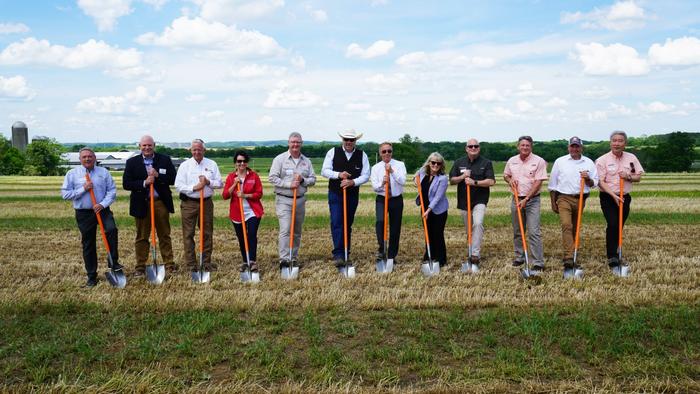Poultry production and processing is a $10 billion industry in Tennessee, with more investment expected. To support the future of the industry, the University of Tennessee Institute of Agriculture is investing in the construction of a state-of-the-art, next generation poultry research and education facility at its Middle Tennessee AgResearch and Education Center in Spring Hill.

Credit: Photo by T. Cronin, courtesy UTIA.
Poultry production and processing is a $10 billion industry in Tennessee, with more investment expected. To support the future of the industry, the University of Tennessee Institute of Agriculture is investing in the construction of a state-of-the-art, next generation poultry research and education facility at its Middle Tennessee AgResearch and Education Center in Spring Hill.
On Thursday, May 2, nearly 100 state and local officials and members of the poultry production and processing industry joined university officials to celebrate the official groundbreaking for the new project. Four commercial-size (54’ x 600’) broiler production houses as well as supporting facilities, including a research and teaching lab and office spaces, are to be constructed on the site. The facility will be the premier commercial broiler research unit in the country and will support the university’s land-grant mission of teaching, research and practical application.
UT System President Randy Boyd thanked the honored guests and partners for their successful support of the facility and the benefits it will bring in terms of animal welfare, production efficiency and workforce development. Among the guests at the event were Tennessee Commissioner of Agriculture Charlie Hatcher, Spring Hill Mayor Jim Hagaman, Maury County Mayor Sheila Butt, Tennessee Farm Bureau President Eric Mayberry, and a delegation of officials from Tyson Foods, including Vice President for Live Operations Shane Joyner.
All agree that building the facility makes sense for Tennessee. The state ranks 15th in broiler production in the nation and statewide has a processing capacity of more than 8 million birds per week. What’s more, approximately 45% of the world’s broiler meat traces back to Tennessee’s primary breeder operations and genetics. The new facility is expected to contribute to future growth of the industry across the state and nation.
In a short presentation before the groundbreaking, Joyner shared the main focus of the facility is researching production animal health and well being, in addition to industry and environmental sustainability. He also emphasized the advantages to processers and consumers alike. “With UT’s expertise in research and our expertise in the industry, we are going to do a lot of good things for a lot of people. This facility will become a talent hub for the industry in the area, and we’ve needed that for a long time,” he said.
Keith Carver, UT Institute of Agriculture Senior Vice President and Senior Vice Chancellor, and Hongwei Xin, dean of UT AgResearch, also noted that it’s the role of UTIA to educate current and future members of the workforce along with enhancing producer success.
“From precision livestock farming techniques, to sprinkler cooling and water conservation efforts, to the latest in lighting research and the most advanced animal welfare research, the facility will provide students and researchers, growers, and allied industry personnel opportunities that have never before been possible,” said Xin. He also stressed the importance of increasing production capacity to support the world’s growing human population.
Construction is expected to be completed in the latter part of 2025, and at maximum capacity, the facility will house approximately 160,000 broiler chickens.
The University of Tennessee Institute of Agriculture is comprised of the Herbert College of Agriculture, UT College of Veterinary Medicine, UT AgResearch and UT Extension. Through its land-grant mission of teaching, research and outreach, the Institute touches lives and provides Real. Life. Solutions. to Tennesseans and beyond. utia.tennessee.edu.
Subject of Research
Animals



